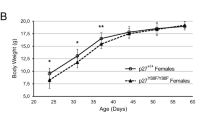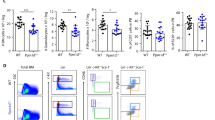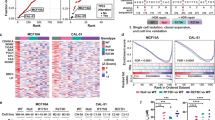Abstract
The p53 gene is a growth control gene, abnormalities of which have been implicated in a variety of cancers. Recently wild-type p53 has been shown to exist in two interchangeable conformational variants, which can be distinguished by specific p53 monoclonal antibodies. One conformation acts as a suppressor (PAb240-/PAb1620+) and one acts as a promoter (PAb240+/PAb1620-) of cell proliferation; the latter conformation is also that of mutant p53. We have previously shown that acute myeloblastic leukaemia (AML) blasts which proliferate autonomously in vitro express only p53 in the promoter conformation. In contrast, expression of PAb1620 was found only in blasts with non-autocrine growth in vitro and was diminished following stimulation by exogenous growth factors when there was a switch to p53 in the promoter (PAb240+) conformation. As AML blasts with non-autocrine growth undergo apoptosis when deprived of exogenous growth factors, we studied whether this was mediated by wild-type p53. Antisense oligonucleotides to p53 were used to suppress p53 protein expression in blasts with non-autocrine growth and also the factor-dependent human erythroleukaemia cell line TF-1. Following growth factor deprivation for 48 h, 20.6-53.6% of control blasts were apoptotic and demonstrated a typical 'ladder' on DNA electrophoresis characteristic of internucleosomal degradation of DNA. In the presence of p53 antisense, apoptosis was suppressed despite the absence of growth factor, however cell proliferation was not stimulated. We conclude that apoptosis occurring in factor-dependent AML blasts following growth factor deprivation is mediated by wild-type p53 (PAb1620+), and that conformational change of p53 to the PAb240+ conformation occurring either by mutation or by the action of autocrine growth factors would permit leukaemic cell survival by suppressing apoptosis.
This is a preview of subscription content, access via your institution
Access options
Subscribe to this journal
Receive 24 print issues and online access
$259.00 per year
only $10.79 per issue
Buy this article
- Purchase on Springer Link
- Instant access to full article PDF
Prices may be subject to local taxes which are calculated during checkout
Similar content being viewed by others
Author information
Authors and Affiliations
Rights and permissions
About this article
Cite this article
Zhu, YM., Bradbury, D. & Russell, N. Wild-type p53 is required for apoptosis induced by growth factor deprivation in factor-dependent leukaemic cells. Br J Cancer 69, 468–472 (1994). https://doi.org/10.1038/bjc.1994.85
Issue Date:
DOI: https://doi.org/10.1038/bjc.1994.85
This article is cited by
-
Thrombopoietin-induced conformational change in p53 lies downstream of the p44/p42 mitogen activated protein kinase cascade in the human growth factor-dependent cell line M07e
Oncogene (1999)
-
p53 status of newly established acute myeloid leukaemia cell lines
British Journal of Cancer (1999)
-
Immunoreactivity of bcl-2, p53 and EGFr is associated with tumor stage, grade and cell proliferation in superficial bladder cancer
Urological Research (1997)



